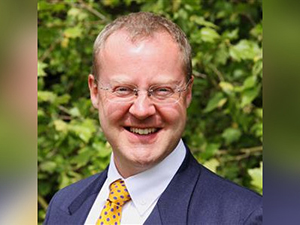Talk us through your typical day
I have two kinds of day.
 Either I am in the office moving my work on and developing new projects or plans for projects, or I am out and about, meeting our scientists, clients and contacts who will hopefully develop into partners or customers to develop commercial opportunities.
Either I am in the office moving my work on and developing new projects or plans for projects, or I am out and about, meeting our scientists, clients and contacts who will hopefully develop into partners or customers to develop commercial opportunities.
How does your work contribute to our mission?
Income from drugs like abiraterone that were discovered here at the ICR directly helps in our fight to defeat cancer.
My role is to find business opportunities that contribute to that goal by commercialising our discoveries and inventions.
I am also working on developing business opportunities that will occupy the London Cancer Hub – our life-science campus in Sutton, south London – which aims to become the world's leading centre specifically focusing on integrating cancer research, treatment and education with commercial enterprise.
Are there any big projects that you are working on?
How about the London Cancer Hub? That's pretty big at 280,000 square metres! Also, contributing to an expansion of entrepreneurial activities at the ICR, for example through a new industry secondments programme.
What are you most proud of?
I'm pleased to have set up our Partnering to Defeat Cancer Industrial Engagement events at the ICR, where our scientists meet with possible future partners from the commercial sector.
Can you give us any examples of where you see the ICR's values in your work?
There is potential to demonstrate our values in every part of what I do. It's hard to be 'excellent' all the time but that should be the goal. I work with many partners inside and outside the ICR. By demonstrating 'integrity' I hope to keep them as partners – I've been working with many of them for much of my career.
By 'working together' we can achieve much more. It is essential that we 'innovate' in our work. There is no place for standing still. I've always wanted to 'make a difference', otherwise what is the point?
Who do you collaborate with at the ICR and elsewhere?
I work closely with the ICR’s Communications Directorate in a number of areas. Outside of the ICR, I'm working with the BIA, the UK Bioindustry Association, and One Nucleus – organisations that help spin out commercial opportunities from research.
I'm also working on projects that could lead to exciting opportunities for our scientists.
What makes you want to work for the ICR?
I have for many years been convinced that better collaboration between academia and industry is key to improving life for us all.
Even more so in the UK, where we have such a strength in academic research. This is my chance to show that I'm right!
What's your favourite part of your job?
I love expanding my knowledge and learning new 'stuff'. It's great to start off new projects and experiment with ideas.
It's even better when I see them up and running and through to completion – which is always the challenge!